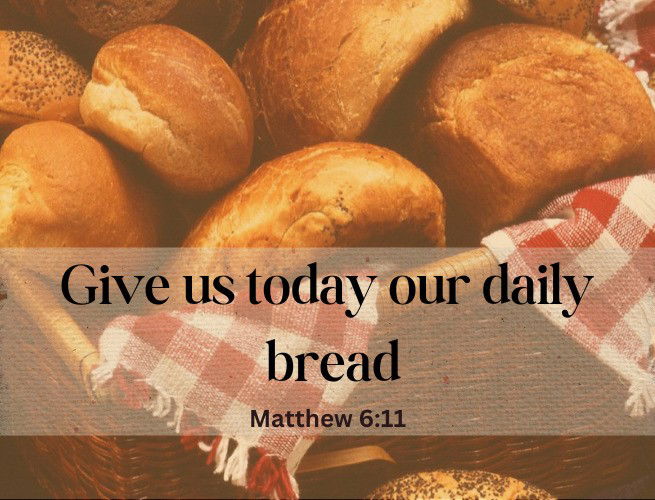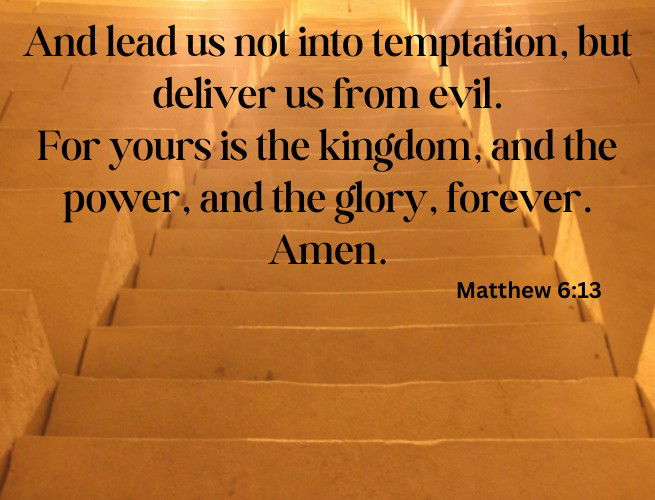The Lord's Prayer, taught by Jesus, is the perfect model of prayer. It teaches us how we should address our prayers to God. The Lord's Prayer is not a magical formula that we need to repeat word for word for it to work, but it is a guide, an orientation for praying to the Lord.

Jesus showed through this prayer what subjects we should normally bring to God in our supplications, which are:
- 3 requests related to God, His honor, His Kingdom, and His glory;
- 3 requests related to human needs (both temporal and spiritual).
Thus, Jesus taught us to seek first the Kingdom of God and His righteousness (Matthew 6:33), and then the other things. We can use the themes of the Lord's Prayer to make our own prayers. The prayer is mentioned below along with the explanations:
Therefore, pray like this:
Our Father in heaven, hallowed be your name.
Your kingdom comes.
Your will be done, on earth as it is in heaven.
Give us this day our daily bread,
and forgive us our debts, as we also have forgiven our debtors.
And lead us not into temptation, but deliver us from evil.
For yours is the kingdom, and the power, and the glory, forever.
Amen .
- Matthew 6:9-13
1. "Our Father..."
Jesus taught us to call God Father. He could have used "Lord," "God," "King," or any other title, but He chose to use "Father" in the prayer. A king may not have children, a lord may not have children, but there is no father without his children.
God is the Father, Creator, and sustainer of all things. He is eternally the Father of our Lord Jesus Christ and of all created beings. But He also chose to adopt believers in Jesus as His children (John 1:12). The heavenly Father has welcomed us as beloved children and desires to have an intimate relationship with us.
Another interesting detail is Jesus using "our" (a plural pronoun). This reminds us of the communal dimension of prayer. Our heavenly Father sees us as brothers and sisters in Christ, so we should live and pray for each other as a family.
The expression "Our Father" does not prevent us from using "my Father" in our personal solitary prayers, but it is a public testimony of recognition of God's Fatherhood over us. We do not have an exclusive or particular God, but He is our Father. We all enjoy this privilege shared by all children in the great family of God.
2."...who is in heaven"
These words do not limit God's presence to heaven. They simply express the infinite greatness and glory of the Lord, above the visible Universe. God has His presence in heaven and on earth (Deuteronomy 4:39).
No 'god' of the visible universe (polytheism or pantheism) can be compared to the heavenly Father who dwells in the heaven of heavens (invisible heaven above the created universe). He is Supreme, exalted in His heavenly Dwelling.
The Father is distinct and superior to us, to all fathers on earth, and to all false gods and idols of this world (Ecclesiastes 5:2). Jesus emphasizes this important fact about the Father who is in heaven, so that we can understand that God is Infinite, Absolute, and Incomparable.
3. "Hallowed be Your name"
To hallow the Name of God is the first request in the Lord's Prayer. The heavenly Father should be hallowed by His children. This means we should glorify God, or the name of God, in everything we do or think, in our attitudes and relationships. Ultimately, everything must honor God's name.
The word sanctify means 'to make holy' or 'set apart'. This separation has to do with the distinction, veneration, and uniqueness of the Lord. God is not comparable to any other being in the Universe. Therefore, no one else should receive the worship due to the Lord.
God is sanctified (honored and glorified) when His existence is believed, when His perfection is loved and revered in our lives (1 Peter 3:15) and when His works are admired and recognized. This is to sanctify God, making Him honored and glorious, just as He is.
Think about this: Jesus instructed us to communicate directly to God. He made it know that we don't need intermediaries like Mary or the saints to connect with God on our behalf. God hears our prayers. But we should pray with respect and humility, asking that God be glorified even in our prayers.
4. "Your kingdom come..."

The coming of God's Kingdom has to do with His eternal rule over all things. God is the divine King and His kingdom is spiritual, moral, and real. The "Kingdom of God" or the "Kingdom of Heaven," or "Christ's Kingdom," etc., had already begun from the beginning but was inaugurated with the coming of Jesus.
The advancement of the Lord's Kingdom over time has been through the acceptance and recognition of God as King and the fulfillment of Messianic expectations with the arrival of the Messiah. Jesus Christ inaugurated the arrival of the Kingdom of God, which still continues until it reaches its fullness at the end times.
Only then, when Christ returns in glory, will the kingdom of God be fully extended to all peoples and nations.
5. "Your will be done, on earth as it is in heaven"
This 3rd request related to God and His Kingdom has to do with His will. While here on earth many still reject God and His will, we know that in Heaven all heavenly beings are committed and fully submissive to God's will.
There is a clear difference between Heaven \and Earth. In heaven God is honored and glorified perfectly by angels and heavenly beings, and while on Earth, many try to fulfill His will but still imperfectly.
This should be our desire today: to rightly fulfill God's will. This is an obedience that involves readiness, dedication, and love. Again, when Christ returns in glory, God's will, will be perfect and complete, done throughout the earth as it is done today in Heaven.
Think about this: How often is prayer laden with blackmail and demand? " God, I want this and that, in this way, today or now ! Otherwise, I'll stop loving you ..." – that is not prayer. You cannot influence God to do your will. God's will is more important than our will. When we pray, we must begin by submitting our will to God's will and surrendering our desires to Him.
6. "Give us today our daily bread..."
Here begins the series of the other three requests that Jesus added to the Lord's Prayer. After asking for God to be glorified, His Kingdom to come, and His will to be done, now we can ask for necessary sustenance and comfort in present life. These petitions relate to human needs: Bread, Forgiveness, and Protection, also in Luke 11:3. Each word reveals an important lesson:
"Our bread" can mean: natural bread and spiritual bread – summarizing all things necessary for the maintenance of life, body, and soul. Honest bread, that is truly ours. Remember Jesus' other teachings: "Man shall not live by bread alone ..." (Matthew 4:4); "I am the living bread that came down from heaven ..." (John 6:51).
"For this day" means that:
- we don't need to worry about tomorrow;
- we are taught to depend daily on Divine Providence;
- we only need what is necessary for today, not to waste or accumulate wealth.
"give us today" this leads us to think about dependence. We need the heavenly Father to have enough for our lives. Therefore, we ask Him: give us! Our requests are not like a transaction - we don't say sell us, lend us, or pay us, as if He were obliged to do so. We humbly ask Him to give us daily bread. We will always be indebted to God for everything He gives us.

Think about this: Revolutions have been started due to lack of bread. Bread is a basic food, important for survival. Our life, our livelihood depends on God. When we recognize this and pray trusting in God, He gives us the sustenance we need, even when it seems impossible.
7. Forgiveness for our debts...
Forgiveness is essential for our lives (at the spiritual, emotional, and relational levels). Every kind of transgression, offense, sin, or vice, offends God and will certainly also hurt other people. In addition, the punishment for these offenses will cause suffering when we have to "pay" for debts before Divine Justice.
The debt of evil we commit, against God and against our neighbor, needs to be recognized, confessed, and abandoned.
However, there is a condition provided in terms of prayer: "Forgive us as we forgive our debtors." Here forgiveness for our shortcomings is conditioned on the forgiveness we also give to others.
We must forgive as we hope to be forgiven. Those who wish to find mercy in God for their mistakes must also show mercy to their neighbor. Even if you have caused them harm, offense, or suffering.

Think about this: An important part of prayer is asking for and offering forgiveness. We must be humble to recognize our mistakes and ask God for forgiveness. But we must also forgive those who have sinned against us. When we understand that God forgives us when we don't deserve it, we must do the same for other people who don't deserve it.
8. Protection - "lead us not into temptation..."
Here Jesus begins the sixth petition. He shows us that the trials or temptations of life can be overcome. With the help of the heavenly Father, we can be preserved from sin. This means that He can remove the temptation when it is too strong, or He can mitigate the forces of temptation, or He can increase our strength against it.
This request teaches us to consider our own inability to ward off and overcome temptation. It also shows how we need empowerment from above to resist on a bad day.
Resistance against temptation and trial produces in us the result of joy and resilience. As it is said: "Consider it pure joy, my brothers and sisters, whenever you face trials of many kinds, because you know that the testing of your faith produces perseverance." (James 1:2-3). This becomes an exercise in refining faith, godliness, and virtues, so that others may be encouraged by our perseverance in trials.
9. Protection - "deliver us from evil"
Here the word in Greek for 'evil', "πονηρός" (ponēros) can mean evil in the abstract sense in general, as well as 'Evil', equivalent to the devil or Satan. The inclusion of this expression in the prayer helps us to remember that we run another danger, we have an Accuser who also tempts us to evil.
In addition to the sin of our nature and our carnal inclination, there is the Devil, who manipulates and deceives us into evil. Let us remember that, like a thief, he came to kill, steal, and destroy (John 10:10).
This may be the reference in prayer that completes the idea of surrender from temptation. Deliver us from all kinds of evils, including the Tempter who is our Enemy.
10. "For yours is the Kingdom, Power, and Glory..."
This end of prayer, called the "doxology" (conclusive expression of glorification and praise to God), does not appear in all ancient manuscripts. Therefore, it appears in brackets in the translations of our Bibles. However, this final part expresses the understanding that the glory and honor of God should be the main goal of the children's prayer. The glorification of God should lead our prayers from beginning to end.
"Yours is the Kingdom" - Here it shows the conviction that God is sovereign and has total dominion over the universe. He controls everything, for He reigns and rules over everything.
"Yours is the Power" - We believe that the Father, almighty in Heaven and on Earth, has the power to accomplish what we ask for. We are weak and needy, but God can do all things, nothing is impossible for Him.
"Yours is the Glory" - Our prayers are heard and answered for the honor and praise of God, not ourselves. God's glory is demonstrated when He provides for our needs. Praise and gratitude to the Lord will be celebrated by expanding the Kingdom of God on Earth.

Think about this: God does not save us from all difficulties, but He helps us stand firm in the struggle against sin. When we are struggling against temptations, we can ask for God's strength to do what is right. God is stronger than sin. When we overcome sin, we show the glory of the Kingdom of God.
Use the Lord's Prayer as a model to address God in prayer. With the help of the Holy Spirit, dedicate some time today to pray to God.
See also:
